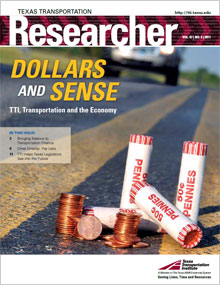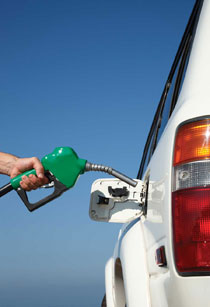Answers from the Expert: Understanding Fuel Prices from the Inside Out
Dave Ellis is the Texas Transportation Institute’s resident expert on economic trends associated with fuel prices and driving behavior. Recently we asked him some questions about why gas prices rise and fall so dramatically from time to time. Here’s what he had to say.
-
Why are gas prices really going up? Is it a supply issue?
Some say it’s price speculation, not a shortage, and so there’s no supply/demand reason for the price of oil to increase. I don’t believe we can blame it all on speculation. There are two parties to every futures contract. For every buyer who thinks the price will go up, there’s a seller who thinks it won’t.
I think the price increase results from a combination of several things, including the instability in North Africa and the Middle East. Also, the weakness of the dollar tends to boost the price of dollar-denominated commodities, and oil is one of those.
-
Will higher gasoline prices lead to increased domestic production of oil?
Domestic production reached its peak in 1985 and then declined until it bottomed out in 2008. Production actually increased slightly in 2009–2010. Whether that’s the beginning of a new trend is debatable. Part of that production increase is due to price. Higher crude prices make potentially marginal wells more profitable. How long and to what extent exploration and drilling in the Gulf of Mexico are affected by the moratorium is also another factor.
-
How much is gasoline in other countries? Why is it so high in some places?
As of April 1, gasoline cost about $9.63 per gallon in Turkey, and a little over $8 in the Netherlands and the U.K. If you want a good deal on gasoline, you can try Caracas, Venezuela, where it’s 6 cents per gallon.
So, why the difference? First, fuel tax rates can vary significantly. In Texas, we pay about 38 cents per gallon in fuel taxes; 20 cents is a state tax, and the rest is federal. In France and the U.K., the fuel tax is about $3.50 per gallon. Also, some governments choose to subsidize the price of gasoline to avoid potential political unrest and mitigate inflationary pressures that fuel-price increases can have on the general economy.
-
How expensive must gasoline get before we start changing our behaviors?
We don’t know with any precision. What I tend to think, though, is that we do change, but we do so gradually and to varying degrees depending on things like lifestyle, age, income and availability of alternatives. Higher fuel prices tend to cause us to think more before we drive. But if we want to decrease our commute distance because of high fuel prices, there are basically two things we can do: change where we work or change where we live. Both changes take time to implement.
-
Did our driving behavior change when gasoline got so expensive in 2007–2008?
Only for a while. But then, the number of miles we drove started to increase again at about the same rate it’s always increased.
-
Do people drive less when gas prices go up?
It depends. If the price goes up a lot and quickly, there tends to be an immediate response. Over time, though, people adjust. Also, a significant summer price increase tends to impact driving more because more of our discretionary driving, like vacation driving, tends to occur during those months.

